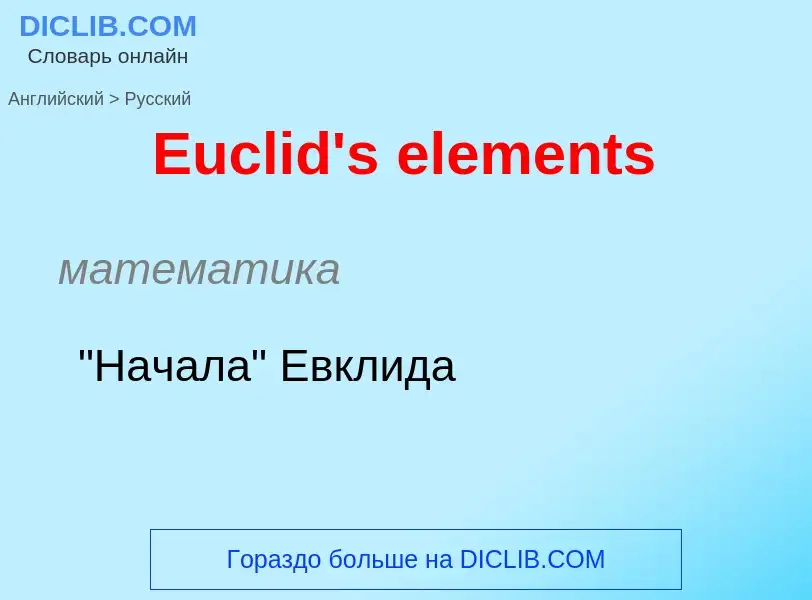Vertaling en analyse van woorden door kunstmatige intelligentie
Op deze pagina kunt u een gedetailleerde analyse krijgen van een woord of zin, geproduceerd met behulp van de beste kunstmatige intelligentietechnologie tot nu toe:
- hoe het woord wordt gebruikt
- gebruiksfrequentie
- het wordt vaker gebruikt in mondelinge of schriftelijke toespraken
- opties voor woordvertaling
- Gebruiksvoorbeelden (meerdere zinnen met vertaling)
- etymologie
Euclid's elements - vertaling naar russisch
математика
"Начала" Евклида
Definitie
Wikipedia
.jpg?width=120)
Euclid's Elements (Ancient Greek: Στοιχεῖα Stoikheîa) is a mathematical treatise consisting of 13 books attributed to the ancient Greek mathematician Euclid in Alexandria, Ptolemaic Egypt c. 300 BC. It is a collection of definitions, postulates, propositions (theorems and constructions), and mathematical proofs of the propositions. The books cover plane and solid Euclidean geometry, elementary number theory, and incommensurable lines. Elements is the oldest extant large-scale deductive treatment of mathematics. It has proven instrumental in the development of logic and modern science, and its logical rigor was not surpassed until the 19th century.
Euclid's Elements has been referred to as the most successful and influential textbook ever written. It was one of the very earliest mathematical works to be printed after the invention of the printing press and has been estimated to be second only to the Bible in the number of editions published since the first printing in 1482, the number reaching well over one thousand. For centuries, when the quadrivium was included in the curriculum of all university students, knowledge of at least part of Euclid's Elements was required of all students. Not until the 20th century, by which time its content was universally taught through other school textbooks, did it cease to be considered something all educated people had read.

.jpg?width=200)
![Byrne]]'s ''The Elements of Euclid'' and published in colored version in 1847. Byrne]]'s ''The Elements of Euclid'' and published in colored version in 1847.](https://commons.wikimedia.org/wiki/Special:FilePath/Byrne 1847 Satz des Pythagoras Hochformat.jpg?width=200)
![A page with marginalia from the first printed edition of ''Elements'', printed by [[Erhard Ratdolt]] in 1482 A page with marginalia from the first printed edition of ''Elements'', printed by [[Erhard Ratdolt]] in 1482](https://commons.wikimedia.org/wiki/Special:FilePath/Euclid's Elements, 1482.jpg?width=200)


![Ishaq ibn Hunayn's]] Arabic Translation of Elementa. [[Iraq]], 1270. [[Chester Beatty Library]] Ishaq ibn Hunayn's]] Arabic Translation of Elementa. [[Iraq]], 1270. [[Chester Beatty Library]]](https://commons.wikimedia.org/wiki/Special:FilePath/Illustrated Opening. Arabic Translation of Euclid's Elementa (CBL Ar 3035, ff.105b-106a).jpg?width=200)
![A fragment of Euclid's ''Elements'' on part of the [[Oxyrhynchus papyri]] A fragment of Euclid's ''Elements'' on part of the [[Oxyrhynchus papyri]]](https://commons.wikimedia.org/wiki/Special:FilePath/P. Oxy. I 29.jpg?width=200)
![[[Artus Wolffort]], ''The Four Elements'', before 1641 [[Artus Wolffort]], ''The Four Elements'', before 1641](https://commons.wikimedia.org/wiki/Special:FilePath/Artus Wolffort - The Four Elements.jpg?width=200)

